Terrence Howard sat in a suite at the Waldorf Astoria, behind a desk and in front of an open folder. Inside one of the pockets was a thick stack of clear plastic discs, adorned with intricate pinwheel print. He stared down at the discs, filling in a few tiny boxes with a red marker before pushing it aside and taking out another.
"Just doodling today to keep my hands moving," he said; Howard will rarely lift his eyes from the work throughout the interview.
Despite the distraction, Howard, an Oscar nominee who co-stars in the box office-winning historical drama Lee Daniels' The Butler, is a thoughtful, honest interview — to a point. Days after his August 2nd discussion with BuzzFeed, his ex-wife Michelle Ghent will allege that he "sucker punched" and beat her during a vacation to Costa Rica. Howard will deny the charges.
During his talk with BuzzFeed, Howard described the trip thusly: "I spent the last month and a half in Costa Rica, getting reconnected with the land. Chilling with the family, vacationing. The thing we all need to do every once in awhile, we need to walk away from the daily grind and get back into the thing called life."
Nonetheless, Howard did have a lot to say about Daniels' movie — in which he plays a sleazy neighbor to star Forrest Whitaker, the film's titular White House butler — and the state of America's politics and civil liberties.
"There's Free Speech Zones in America, where America was the Land of the Free," the actor lamented. "The PATRIOT Act has taken away all the civil liberties that we had. The due process, which they fought so hard to get out from England's tyranny because they did not have due process. We no longer have the due process, and one day we will regret handing over the keys of freedom. We're gonna regret the establishment of the Federal Reserve Bank and its lack of accountability to the American people and to the government and constitutionality as a whole. There are a number of things we're going to regret, but more than likely, we'll have overcome a lot of those things."

You're part of an All-star team here.
Terrence Howard: Mmhmm. The other people standing behind, even the smaller roles, are like All-Stars. It's like the NBA all-star game and you look over and it's Kobe sitting on the bench with LeBron and you still got the game playing. Everybody's spectacular in this movie.
So many good roles, so how'd you end up with this one?
TH: It was the only role left in the movie. It was like, I wanted the other cereal, I wanted some of the Froot Loops, but all I had let was some of the Chex Mix and I had to pour a little milk in and try to get something out of it. But thats the stuff worth doing, imitation brings about genius. There are no little roles, just little actors.
You were part of some pivotal plot points, but you weren't on set for some of more of the intense, Civil Rights-era fights.
TH: There was so much I didn't see in that movie. But I'm glad I didn't get to see it, because my character hid himself away behind the drugs and the alcohol, even though you didn't see him doing anything. You did see him smoke a little pot, you did see him destroying families, and you did see him drinking a lot of alcohol. He's trying to drown something within himself, something that's probably pretty much already dead.
What's he trying to drown?
TH: His own consciousness, because his moral responsibility has not been reached. In terms of taking a stand against inequality and being willing to put his own life on the line for the sake of the growth of humanity as a whole. Not just black people. Because what's good for black people is what's good for all people. Because the black people are just the tan people of the household of the human family, but we're all one household.
The things that activists went through were obviously incredibly tough and dangerous, so you can understand reticence to put your life on the line like that.
TH: Because you'd lose it. But that's the thing that separates a hero from the average man. The hero is aware of the dangers, but he's impelled — he's not compelled from the outside, he's impelled from a principle within that's greater than a desire and need to further his own being; it's the greater being of the whole. Like Martin [Luther King Jr.] knew that his days were numbered, but his sacrifice and spilled blood, the blood of Malcolm X, the blood of Marcus Garvey. The tears of Cecil I believe is of equal value to their spilled blood, because of him learning to bite his tongue for those many years.
In one scene, Martin Luther King Jr. says it's a very subversive thing, to be a butler, to quietly change perceptions through that work.
TH: The Bible, Paul says, The tongue is the smallest member of the body, but with it, more people are damaged and bring harm to themselves; the most powerful of men is the one that's learned to control that little, bitty member.

How important is it that a black filmmaker made this movie?
TH: Well, if another individual made the film, perhaps they can sympathize with the plight of black America — even though we're all part of the same human family, it's only those people that's been out there in the field during the day, planting the bushes and all that, that has the tan, the sunburn on their back, that can empathize and really tell how that story really affected from an insider's perspective. I feel if any man of a different race, or a woman of a different race, told this story, they'd have to tell it from the point of view of an observer; they couldn't tell it from a subjective point of view.
And I think it's extremely necessary to tell this from an outsider's perspective, which the black man, during this time, was more of the disenfranchised and outside the wealth, outside the congratulations and the love and embracing nature that the rest of the world was given.
The movie ends with Obama being elected...
TH: Obama got elected president?
He did!
TH: Can you believe it? They let a Muslim get in the White House? I thought he blew up the World Trade Center. Oh, that was Osama. [Laughs]
The movie ends with this big change, finally a black man is in charge of the Oval Office instead of serving in it, but the movie leaves it there; do you think that election has led to the sort of sea change for the black community that the movie implies was on the way?
TH: Well, the best part about it is there's no more excuses anymore. They'll never let a black man become president. No, they didn't let a black man become president; a black man fought and won the race. No one will let you do anything. You have to fight for it and it has to be purposeful and you need to deserve it, you have to be worthy of it. Nobody will let you do anything. You have to fight for it, and it has to be purposeful and you need to deserve it and you have to be worthy of it. The only way that humanity is going to grow and rise as a race, as a sustainable race, is when we fight for our human rights as a collective, in cooperation with the rights of every other existing thing in the universe.
Let's say this sort of movie gets made in 25 years; is there another civil rights struggle that you believe could be highlighted in the same way?
TH: I think that's a hard thing to say, if we can make it 25 years without wiping ourselves out, I think it would be the struggle to stop government. The fear of over-government.
